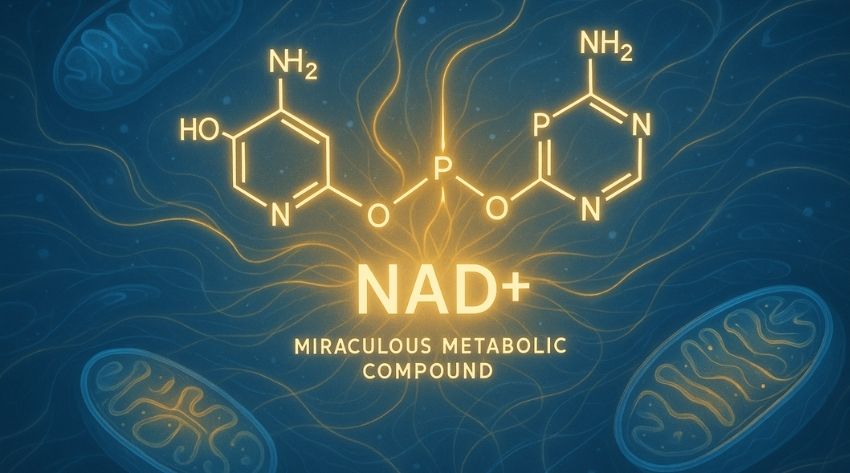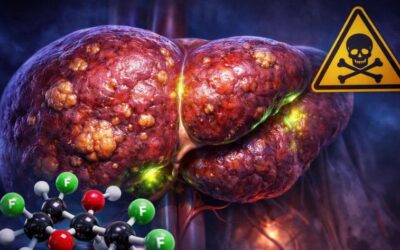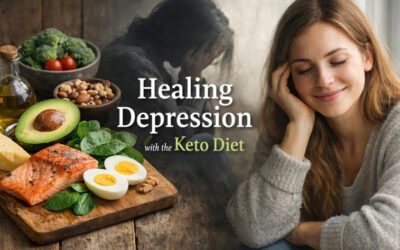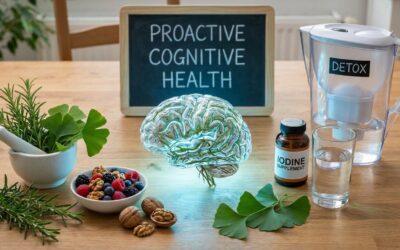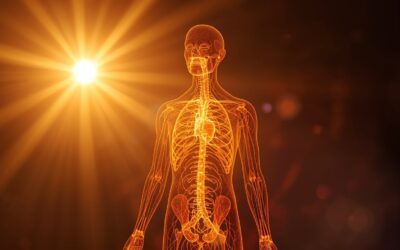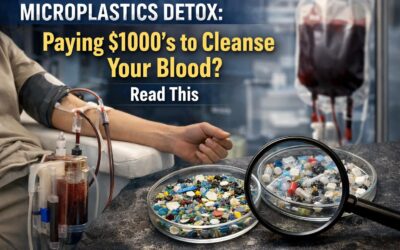NAD+ is having a moment.
If you’ve listened to a biohacking podcast, visited an IV therapy clinic, or been in a longevity forum lately, you’ve heard the hype. NAD+ is being hailed as the cellular currency of energy and youth—capable of powering mitochondrial function, reversing aging, boosting brain power, and even extending lifespan.
Many people are now turning to NAD supplements as a way to combat aging, slow age-related decline, and support longevity, making it a central part of the broader anti-aging and biohacking movement.
And yes—there’s truth to all of that. But here’s the part no one talks about:
NAD+ isn’t always safe. And if your metabolic terrain is compromised—whether by histamine intolerance, methylation issues, spike protein exposure, sulfur sensitivity, or even underlying cancer—it may be doing more harm than good.
So before you jump into NAD+ infusions or load up on NMN supplements, it’s critical to understand the terrain you’re working with.
Let’s break it down.
What Is NAD+ and Why is Everyone Talking About it?
NAD+ (nicotinamide adenine dinucleotide) is an essential coenzyme found in every cell. It acts like a metabolic activator—helping turn nutrients into energy, protecting DNA from damage, and regulating aging through its role in:
- ATP production via the electron transport chain
- Energy metabolism, supporting efficient cellular energy production and metabolic pathways
- Sirtuin activation, which governs longevity and stress resistance
- DNA repair through PARP enzymes
- Gene expression and epigenetic regulation
- Neuroprotection by supporting healthy neurotransmitter metabolism and brain oxygenation
- Detoxification, including the activation of Phase I and II liver enzymes
The body naturally synthesizes and recycles NAD+ through three main pathways:
- The De Novo Pathway – from tryptophan
- The Preiss-Handler Pathway – from niacin
- The Salvage Pathway – from nicotinamide (NAM)
Compounds such as nicotinamide riboside (NR) and nicotinamide mononucleotide (NMN) are considered NAD precursors because they serve as building blocks for NAD+ in these pathways. As NAD precursors, NR and NMN play a crucial role in boosting cellular NAD+ levels, which supports physiological function and promotes healthy aging.
This recycling process is efficient in healthy individuals with optimal nutrition, detox capacity, and metabolic function. However, these levels decline with age, illness and toxicity, leading to less than optimal physiological function. The decline in cellular NAD can impair energy metabolism and contribute to the aging process.
That’s when fatigue sets in, brain function declines, recovery slows, and the “aging switch” gets flipped. This is why so many are focused on NAD supplementation.
NAD+ vs. NADH
When it comes to cellular energy and healthy aging, NAD+ and NADH are the unsung heroes working behind the scenes. Both are forms of nicotinamide adenine dinucleotide, an essential coenzyme found in every cell.
NAD+ is the oxidized form of nicotinamide adenine dinucleotide , while NADH is the reduced form of nicotinamide adenine dinucleotide—think of them as two sides of the same coin, constantly cycling to keep your body’s energy engines running.
NAD+ acts as a key player in energy production, helping to convert the food you eat into usable cellular energy through the mitochondria. It also supports DNA repair, gene expression, and the activation of longevity pathways.
NADH, on the other hand, carries electrons during metabolic reactions, fueling the production of ATP—the energy currency of your cells.
As we age, NAD+ levels naturally decline, which can slow down energy production and impair cellular health. This drop is linked to a range of age-related issues, from metabolic disorders to neurodegenerative diseases.
Reduced NAD+ levels are also associated with the development of chronic diseases, including cardiovascular, metabolic, and neurodegenerative conditions. Supplementation with NAD+ may help address these risks by restoring NAD+ levels and improving physiological function over time. That’s where NAD supplements and NAD precursors like nicotinamide riboside (NR) and nicotinamide mononucleotide (NMN) are thought to come in. By boosting NAD+ levels, these dietary supplements may help support DNA repair, energy production, and overall cellular health, making them a promising tool for those looking to combat the aging process and maintain vitality.
Understanding the balance between NAD+ and NADH is crucial—not just for energy, but for supporting healthy aging and resilience against age-related decline. By choosing the right NAD boosting supplements, you can help your body maintain this dynamic duo and keep your cells functioning at their best.
NAD+ Pills, Powders, and IVs—What’s the Best Method?
When it comes to NAD supplementation, not all forms are created equal. Whether you’re aiming to support healthy aging, boost energy production, or improve cognitive function, the delivery method of your NAD boosting supplements can make a significant difference in how your body responds. And for some, all of the following options may have unwanted side effects.
Pills
Pills are the most familiar and accessible form of NAD supplements. Typically available as capsules or tablets, oral NAD supplements like nicotinamide mononucleotide (NMN) and nicotinamide riboside (NR) are designed for daily use and easily added into your routine. These compounds are commonly available as oral supplements, which are widely used due to their convenience and accessibility. These supplements have been shown in human clinical trials to increase NAD levels, enhance insulin sensitivity, and support muscle function in healthy adults. However, the bioavailability of NAD in pill form can vary, and some individuals may experience mild digestive discomfort or inconsistent absorption.
Powders
Powders offer another convenient option for NAD supplementation.
By mixing powdered NAD precursors with water or your favorite beverage, you may experience faster absorption and greater flexibility in dosing.
Powders are especially popular among those who have difficulty swallowing pills or want to tailor their intake. Some studies suggest that powdered forms of NR and NMN can more efficiently boost NAD levels, potentially leading to improvements in body composition, skeletal muscle acetyl carnitine concentrations, and exercise capacity—particularly in middle aged and older adults.
Some research suggests NAD supplementation may also help improve body composition by supporting metabolic health and insulin sensitivity. Increasing NAD+ levels may also help reduce risk factors associated with metabolic syndrome, such as obesity and insulin resistance.
IVs (intravenous NAD injections)
IV NAD+ is the most direct and rapid method of NAD supplementation. By delivering NAD straight into the bloodstream, IVs bypass the digestive system entirely, resulting in immediate increases in blood NAD levels.
This approach is sometimes used in clinical settings for individuals with severe metabolic disorders, age-related diseases, or those seeking a quick boost in energy and cognitive clarity.
Clinical studies have shown that IV and oral NR supplementation can significantly increase whole blood NAD levels, serving as a biomarker for improved metabolic and cellular function.
However, NAD injections require administration by a healthcare professional, come with higher costs, and may not be suitable for everyone due to the invasive nature and potential for side effects including nausea, abdominal cramping, flushing, sweating headache, rapid heartbeat and more.
Why Synthetic NAD+ Precursors and NAD Supplementation Can Backfire
People try to shortcut the problem with the exogenous NAD+ supplements NMN (nicotinamide mononucleotide) or NR (nicotinamide riboside)—two popular NAD+ precursors used to stimulate the salvage pathway.
And yes, these precursors can increase NAD+ as mentioned above—but not without cost. Clinical trials have evaluated NAD+ precursors like NR in patients with nonalcoholic fatty liver disease, but results have been mixed and further research is needed to determine efficacy and safety in this population.
Let’s look at the risks of using NAD+ precursors.
1. Methylation Drain
Every time your body converts NMN or NR to NAD+, it consumes methyl groups—the very same methyl groups you need to:
- Break down histamine
- Detox estrogen and other hormones
- Metabolize sulfur and ammonia
- Regulate neurotransmitters (dopamine, serotonin, norepinephrine)
- Recycle glutathione and support DNA methylation
If you’re already dealing with impaired methylation (common in people with MTHFR, COMT, MAOA, CBS, or SUOX polymorphisms), you simply don’t have the methyl reserves to spare.
So when you start supplementing with NAD+ precursors, you’re depleting the very system that supports detox, mental health, and immune balance.
This can result in:
- Histamine flares and mast cell activation
- Brain fog, insomnia, and anxiety
- Detox crashes or flu-like symptoms
- Hormonal chaos (PMS, estrogen dominance, low testosterone)
- Fatigue or wired-but-tired patterns
And it’s not rare—I’ve seen this happen over and over in clients who tried NAD+ protocols without supporting the terrain first.
2. Spike Protein Exposure Creates a Perfect Storm
The spike protein—whether from infection or mRNA exposure—creates long-term metabolic chaos. It:
- Activates mast cells and histamine pathways
- Disrupts sulfur and ammonia detox
- Impairs oxygen utilization in mitochondria
- Increases oxidative stress and cellular aging
- Blocks sirtuin activation via chronic inflammation
Trying to boost NAD+ in a terrain damaged by spike protein is like pumping gas into a broken engine. You’re stimulating metabolic pathways that are already overwhelmed—leading to flare-ups, regression, and crashes.
In these cases, the body doesn’t need more NAD+.
It needs to restore mitochondrial integrity, clear toxins, and rebuild enzymatic function first.
3. NAD+ Can Fuel Cancer Cell Growth
This is the most alarming—yet least discussed—risk of NAD+ supplementation.
Because NAD+ supports:
- Cell replication and survival
- DNA repair
- Angiogenesis (blood supply to tissues—including tumors)
- Sirtuin activity, which can protect cancer cells from apoptosis
…it can be used by cancer cells to proliferate and resist treatment. Some tumors are even known to hijack NAD+ pathways to feed their own growth.
While NAD+ itself isn’t carcinogenic, raising NAD+ levels artificially in a terrain already burdened by toxins, inflammation, or pre-cancerous cells could promote tumor survival.
If you’ve had:
- A history of hormone-driven cancers
- High levels of oxidative stress or environmental toxins
- Elevated estrogen or insulin resistance
- Chronic inflammation or immune dysfunction
…you should be extremely cautious with NMN, NR, or NAD+ IVs.
The Science-Backed Benefits of NAD Supplementation
What does the research actually say about the potential benefits of boosting NAD naturally? Let’s explore how NAD supplements may impact cognitive health, physical performance, blood health, and cellular repair—according to the latest clinical evidence.
Cognitive Health: Sharpening the Mind or Hype?
Cognitive function is a cornerstone of healthy aging, and many people turn to dietary supplements in hopes of maintaining mental clarity as they grow older.
Recent human clinical trials have begun to shed light on the effects of NAD supplements on brain health. Some studies suggest that taking NAD supplements can help increase NAD levels in the brain, which may support memory, focus, and overall cognitive function in older adults. These findings are promising, especially for those looking to combat age-related cognitive decline. However, while early results are encouraging, more research is needed to fully understand the long-term effects of NAD supplementation on cognitive health.
As always, it’s wise to consult with a healthcare professional before starting any new dietary supplement, especially if you’re considering NAD supplementation to support brain health.
Physical Health: Energy, Endurance, and Recovery
As we age, maintaining physical vitality becomes increasingly important—and increasingly challenging.
NAD boosting supplements have been studied for their ability to support energy production and muscle function, two key factors in staying active and resilient.
Research shows that taking NAD supplements can help boost NAD levels in skeletal muscle, leading to improvements in energy metabolism and exercise capacity. In particular, NAD supplementation has been linked to increased skeletal muscle acetyl carnitine concentrations, which may enhance muscle recovery and endurance after physical activity.
These benefits are especially relevant for older adults seeking to maintain muscle function and overall physical health. While the evidence is still emerging, NAD supplementation holds promise as a tool for supporting energy, muscle recovery, and healthy aging.
Blood Health: Circulation, Oxygenation, and Beyond
Beyond its effects on the brain and muscles, NAD supplementation may also play a role in supporting blood health and cardiovascular function.
Clinical research has found that NAD supplementation can improve insulin sensitivity and help regulate blood sugar levels, which is particularly beneficial for individuals with metabolic disorders.
Additionally, studies indicate that NAD supplementation may reduce arterial stiffness—a key risk factor for cardiovascular disease—and support healthier blood pressure levels. By promoting better circulation and oxygenation, NAD supplements could offer important benefits for overall metabolic health. However, as with other potential benefits, more research is needed to fully understand the impact of NAD supplementation on blood health and long-term cardiovascular outcomes.
Clinical Trials and Research
Human clinical trials have demonstrated that NAD supplementation is generally safe and effective at increasing NAD levels in healthy adults. For example, a randomized controlled trial found that nicotinamide riboside (NR) supplementation improved muscle insulin sensitivity and reduced blood pressure—two key markers of metabolic health. Other studies have shown that nicotinamide mononucleotide (NMN) can enhance cognitive function and reduce inflammation in older adults, supporting both brain health and healthy aging.
However, these results are with “healthy” adults, and most people today are suffering from fatty liver disease, or at the very least, compromised liver function. If the liver is already overwhelmed, throwing exogenous NAD supplementation could make things worse.
Ongoing research continues to evaluate the impact of NAD supplementation on human health, including its potential to support healthy aging, metabolic function, and the management of chronic diseases.
As always, it’s important to approach new supplements with a critical eye and consult with a healthcare professional before starting any new regimen. But if you’re looking to support healthy aging, cognitive function, and metabolic resilience, the science behind NAD supplementation is promising.
How to Choose an NAD Supplement
With so many NAD supplements on the market, choosing the right one can feel overwhelming. Many supplements in general contain fillers, toxic materials, heavy metals, or other elements that may backfire in the body causing unwanted side effects.
Always check the supplement label for transparency—look for products manufactured by reputable companies that provide clear ingredient lists and dosage information. Third-party certifications, such as those from NSF International or the National Science Foundation, can offer extra peace of mind about quality and purity.
Be cautious of supplements that make exaggerated claims or include unnecessary fillers and additives. And most importantly, consult with a healthcare professional before starting any new dietary supplement, especially if you have underlying health conditions or are taking medications. Your healthcare provider can help you navigate the options and choose the best NAD supplement for your unique needs.
Suggested Dosages of NAD Supplements: How Much Is Too Much?
When it comes to NAD supplements, more isn’t always better. The ideal dosage can vary depending on your age, health status, and specific wellness goals. It’s essential to work with a healthcare professional to determine the right dosage for you. Taking too much NAD supplementation can lead to unwanted side effects like nausea, diarrhea, or headaches, and may interact with certain medications. Always follow the recommended dosage on the supplement label, and check in with your healthcare provider if you have any concerns or experience any adverse effects.
By choosing the right dose and working with a trusted healthcare professional, you can safely enjoy the potential benefits of NAD supplements as part of your healthy aging strategy.
Natural Alternatives to Boost NAD+ for Healthy Aging Safely and Sustainably
If you’re looking to optimize your NAD+ levels—the right way—the key isn’t to force the issue with synthetic precursors like NMN or NR. It’s to support your body’s own ability to produce, recycle, and maintain NAD+ through foundational detox, mitochondrial repair, and metabolic balance.
Alongside these strategies, maintaining a healthy diet—rich in vegetables, lean grass fed proteins, and vitamin B-rich foods—can further support NAD production and overall cellular health.
That’s how you get the benefits of cellular energy, longevity, brain power, and hormone balance—without draining your methylation reserves, triggering histamine reactions, or putting yourself at risk.
Here’s how I guide clients to safely restore NAD+ using powerful, bioavailable natural compounds that work with the body, not against it:
Acceleradine® Iodine
This is one of the most foundational tools for restoring NAD+—by correcting the terrain first.
How iodine works:
- Boosts mitochondrial function and cellular voltage by supporting the thyroid and adrenal glands. This improves ATP output—your body’s energy currency that’s tightly linked to NAD+ cycling.
- Displaces toxic halogens like fluoride, bromine, and chlorine that block iodine uptake in the thyroid and suppress mitochondrial metabolism. These halogens interfere with oxygen use and suppress NAD pathways.
- Enhances detoxification, especially of spike protein residues, xenoestrogens, and heavy metals that hinder mitochondrial respiration.
- Balances hormones and optimizes thyroid-liver axis function—critical for metabolic rate, fat loss, mental clarity, and energy restoration.
Why it matters for NAD+:
Without healthy thyroid and liver function, the enzymatic machinery needed for NAD synthesis can’t work efficiently. Acceleradine® Iodine clears the “roadblocks” to restore oxygenation and metabolic flow—so your body can naturally elevate NAD+ levels without overstimulation.
Accelerated Liver Care®
Your liver is one of the most overlooked players in NAD metabolism—and one of the most vulnerable to modern toxins. Accelerated Liver Care® is specifically designed to gently and effectively restore liver function without sulfur or oxalate overload. It contains 13 strategically chosen, highly concentrated herbs, more powerful than any other liver supplement.
What’s inside:
- TUDCA – a bile acid that supports mitochondrial protection, protein folding (via ER stress relief), and bile flow. Helps the liver process toxic metabolites and enhances nutrient absorption.
- Calcium D-Glucarate – promotes estrogen detox and protects against reabsorption of toxins in the gut.
- Kukti (Picrorhiza kurroa) – supports autophagy and regeneration of liver cells.
- Bupleurum, Milk Thistle, Gold Coin Grass – traditional herbs that improve phase 1 and 2 detox, reduce liver inflammation, and support bile production.
For a comprehensive approach to detoxification, see the Accelerated Diet Cleanse: The Ultimate 30 Day Detox Cleanse.
Why it matters for NAD+:
The liver is central to methylation, sulfur detoxification, and estrogen clearance—all of which affect your ability to synthesize and recycle NAD+. When the liver is congested, your methyl groups go toward survival, not longevity. By clearing the burden and restoring liver efficiency, your body can redirect those resources back into NAD regeneration.
Accelerated C60™
C60 is one of the most powerful antioxidants in existence—and it plays a huge role in protecting the mitochondria, which are both producers and consumers of NAD+.
How it works:
- Neutralizes oxidative stress and free radicals that damage mitochondria and deplete NAD+ stores.
- Protects mitochondrial membranes, enabling efficient electron transport and minimizing NAD leakage or conversion loss.
- Enhances autophagy and detoxification, clearing out old, damaged cells that waste NAD+.
Why it matters for NAD+:
Oxidative stress is one of the primary reasons NAD+ declines with age and illness. C60 helps preserve and protect your existing NAD+ pool by reducing the demand for constant repair and replacement. It doesn’t overstimulate—it restores.
Accelerated Methylene Blue®
A potent mitochondrial optimizer, Accelerated Methylene Blue® works on redox balance, brain energy, and oxygenation—all essential for NAD/NADH cycling.
How it works:
- Improves mitochondrial energy production, acting as an alternative electron carrier in the ETC (electron transport chain).
- Balances NAD+/NADH ratio without requiring methyl donors, which is essential for those with MTHFR or CBS gene variants.
- Increases oxygen utilization and promotes cerebral blood flow, improving mental clarity and neuroplasticity.
- Supports redox recycling, which reduces the NAD drain caused by inflammation or oxidative stress.
Why it matters for NAD+:
Methylene Blue stimulates NAD production gently—without the methylation drain or estrogen flare that NMN or NR can trigger. It’s particularly useful for clients with post-viral fatigue, brain fog, and histamine issues.
Accelerated AMINOS™ with Senactiv®
Unlike basic amino acid blends, Accelerated AMINOS™ is a precision formulation built to support mitochondrial function, protein repair, detoxification, and NAD+ recycling—without the burden of incomplete digestion or synthetic additives. If you’re seeking an alternative amino acid supplement to PerfectAmino, you may want to learn more about what sets this blend apart.
- Promotes mitophagy, clearing out damaged mitochondria that waste NAD.
- Stimulates mitochondrial biogenesis, allowing for more NAD-powered energy hubs to form.
- Reduces inflammation and enhances muscle regeneration, redirecting NAD+ toward cell building rather than damage control.
Other key ingredients:
- Essential Amino Acids (EAAs): Fuel the synthesis of NAD+-dependent enzymes like sirtuins and help regulate mTOR and AMPK balance.
- OKG (Ornithine Alpha-Ketoglutarate): Helps clear ammonia and supports glutamine pathways needed for mitochondrial integrity.
- HMB (Beta-Hydroxy Beta-Methylbutyrate): Preserves muscle tissue, reduces NAD+ consumption during catabolism, and enhances energy efficiency.
- AstraGin®: Improves absorption of nutrients, amino acids, and NAD precursors through the gut lining.
- TMG (Trimethylglycine): Provides critical methyl donors to support methylation cycles and detox pathways—preventing the NAD “crash.”
- Orotic Acid: Helps rebuild mitochondrial DNA and ATP—foundational for sustainable NAD production.
Together, these ingredients create a stable, methylation-friendly environment for NAD+ to thrive in.
Biological Age and NAD: Can You Turn Back the Clock?
We all know our chronological age—the number of birthdays we’ve celebrated—but biological age tells a deeper story about how well our bodies are actually aging. Factors like lifestyle, stress, and cellular health can make your biological age higher or lower than your calendar years. One of the key players in this process? NAD+.
While no supplement can completely stop the clock, boosting NAD+ naturally may help slow down age-related decline and support a healthier, more vibrant biological age. Many people report improvements in skin health, sharper cognitive function, and increased vitality when taking supplements that naturally increase NAD as part of a healthy lifestyle. If your goal is to support healthy aging and feel younger from the inside out, NAD- supporting supplementation could be a valuable addition to your anti-aging toolkit.
Bottom Line: Optimize, Don’t Overdrive
Yes—NAD+ is essential for energy, longevity, and mitochondrial resilience.
But more isn’t always better.
Flooding the system with synthetic precursors like NMN or NR may give a temporary lift—but at the cost of:
- Methylation overload
- Histamine and sulfur flares
- Detox crashes and inflammation
- And possibly, cancer cell survival in the wrong terrain
Recent actions by the Food and Drug Administration have impacted the availability and regulation of certain NAD-related compounds, making it important for consumers to stay informed about supplement legality and safety.
That’s not a long-term strategy.
The real solution? Work with your body—not against it.
If your goal is deep energy, graceful aging, and long-term resilience, this root-cause strategy will always outperform the shortcut.
NAD supplements work by boosting NAD levels in the body, but taking NAD supplements should be done thoughtfully and under professional guidance.
While many health benefits of NAD supplementation are supported by clinical research, preclinical studies suggest there may be additional effects that are still being explored.
Sara Banta
Sara Banta is a Stanford University Graduate with a Degree in Economics and Psychology, and a certified Natural Supplement Expert & Graduate of the Institute for Integrative Nutrition. Sara is the Founder of Accelerated Health Products and host of the health & wellness podcast, Accelerated Health Radio.
- Sara Banta
- Sara Banta
- Sara Banta
- Sara Banta
- Sara Banta
- Sara Banta
- Sara Banta
- Sara Banta
- Sara Banta
- Sara Banta
- Sara Banta
- Sara Banta
- Sara Banta
- Sara Banta
- Sara Banta
- Sara Banta
- Sara Banta
- Sara Banta
- Sara Banta
- Sara Banta
- Sara Banta
- Sara Banta
- Sara Banta
- Sara Banta
- Sara Banta
- Sara Banta
- Sara Banta
- Sara Banta
- Sara Banta
- Sara Banta
- Sara Banta
- Sara Banta
- Sara Banta
- Sara Banta
- Sara Banta
- Sara Banta
- Sara Banta
- Sara Banta
- Sara Banta
- Sara Banta
- Sara Banta
- Sara Banta
- Sara Banta
- Sara Banta
- Sara Banta
- Sara Banta
- Sara Banta
- Sara Banta
- Sara Banta
- Sara Banta
- Sara Banta
- Sara Banta
- Sara Banta
- Sara Banta
- Sara Banta
- Sara Banta
- Sara Banta
- Sara Banta
- Sara Banta
- Sara Banta
- Sara Banta
- Sara Banta
- Sara Banta
- Sara Banta
- Sara Banta
- Sara Banta
- Sara Banta
- Sara Banta
- Sara Banta
- Sara Banta
- Sara Banta
- Sara Banta
- Sara Banta
- Sara Banta
- Sara Banta
- Sara Banta
- Sara Banta
- Sara Banta
- Sara Banta
- Sara Banta
- Sara Banta
- Sara Banta
- Sara Banta
- Sara Banta
- Sara Banta
- Sara Banta
- Sara Banta
- Sara Banta
- Sara Banta
- Sara Banta
- Sara Banta
- Sara Banta
- Sara Banta
- Sara Banta
- Sara Banta
- Sara Banta
- Sara Banta
- Sara Banta
- Sara Banta
- Sara Banta
- Sara Banta
- Sara Banta
- Sara Banta
- Sara Banta
- Sara Banta
- Sara Banta
- Sara Banta
- Sara Banta
- Sara Banta
- Sara Banta
- Sara Banta
- Sara Banta
- Sara Banta
- Sara Banta
- Sara Banta
- Sara Banta
- Sara Banta
- Sara Banta
- Sara Banta
- Sara Banta
- Sara Banta
- Sara Banta
- Sara Banta
- Sara Banta
- Sara Banta
- Sara Banta
- Sara Banta
- Sara Banta
- Sara Banta
- Sara Banta
- Sara Banta
- Sara Banta
- Sara Banta
- Sara Banta
- Sara Banta
- Sara Banta
- Sara Banta
- Sara Banta
- Sara Banta
- Sara Banta
- Sara Banta
- Sara Banta
- Sara Banta
- Sara Banta
- Sara Banta
- Sara Banta
- Sara Banta
- Sara Banta
- Sara Banta
- Sara Banta
- Sara Banta
- Sara Banta
- Sara Banta
- Sara Banta
- Sara Banta
- Sara Banta
- Sara Banta
- Sara Banta
- Sara Banta
- Sara Banta
- Sara Banta
- Sara Banta
- Sara Banta
- Sara Banta
- Sara Banta
- Sara Banta
- Sara Banta
- Sara Banta
- Sara Banta
- Sara Banta
- Sara Banta
- Sara Banta
- Sara Banta
- Sara Banta
- Sara Banta
- Sara Banta
- Sara Banta
- Sara Banta
- Sara Banta
- Sara Banta
- Sara Banta
- Sara Banta
- Sara Banta
- Sara Banta
- Sara Banta
- Sara Banta
- Sara Banta
- Sara Banta
- Sara Banta
- Sara Banta
- Sara Banta
- Sara Banta
- Sara Banta
- Sara Banta
- Sara Banta
- Sara Banta
- Sara Banta
- Sara Banta
- Sara Banta
- Sara Banta
- Sara Banta
- Sara Banta
- Sara Banta
- Sara Banta
- Sara Banta
- Sara Banta
- Sara Banta
- Sara Banta
- Sara Banta
- Sara Banta
- Sara Banta
- Sara Banta
- Sara Banta
- Sara Banta
- Sara Banta
- Sara Banta
- Sara Banta
- Sara Banta
- Sara Banta

